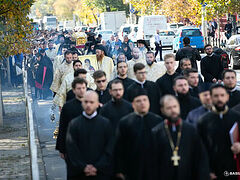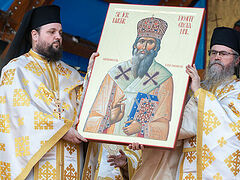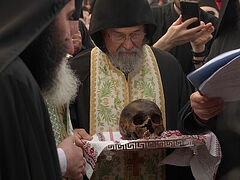Bucharest, October 27, 2023
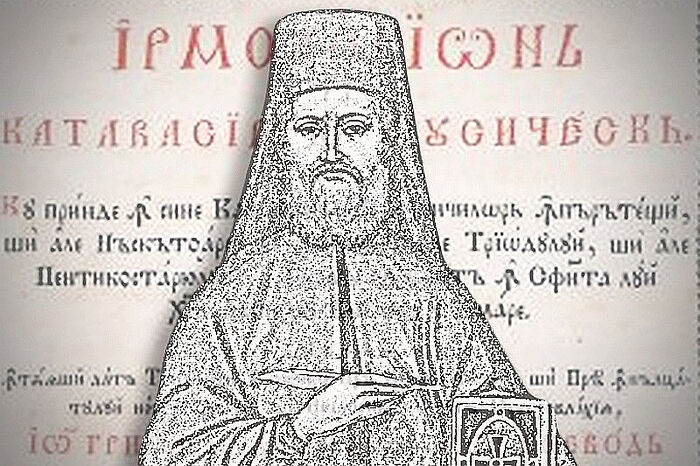 St. Macarie the Protopsaltis. Photo: ziarullumina.ro
St. Macarie the Protopsaltis. Photo: ziarullumina.ro
The Holy Synod of the Romanian Orthodox Church added a new saint to its liturgical calendar yesterday, and blessed the process for the canonization of another venerated elder.
Meeting in Bucharest October 25-26 under the chairmanship of His Beatitude Patriarch Daniel, the Synod approved the canonization of the Venerable Macarie the Protopsaltis (1770-1836), with his feast established as August 31, reports the Basilica News Agency.
The texts for his life, liturgical service, and akathist, as well as his icon were also approved.
St. Macarie is especially known as the father of Romanian-language Church music.
The Synod also approved the proposal of the Metropolis of Bessarabia (Moldova) to start the canonization process of Protosinghel Iraclie (Flocea, 1893-1964), who suffered in the Stalinist gulags.
***
St. Macarie, Protopsaltis of the Metropolitan Church of Bucharest, was the most famous music teacher of his time and a great composer of Church music.
He was born in Perieți, Ialomița County, around 1770. Being endowed by God with a love of the Church and the gift of singing, he learned to chant from an early age. Then he and his sister decided to take up the monastic life, and St. Macarie entered Căldăruşani Monastery.
Hearing of his talent, Metropolitan Dositei brought him to Bucharest and sent him to St. Sava College. He then ordained him as a hieromonk. In 1820, seeing St. Macarie’s proficiency in both ancient and modern styles of chant, appointed him director of the school of Church music, where he helped prepare candidates for the priesthood.
Venerable Macarie was a humble and spiritually advanced monk, a good servant of the Church of Christ and a distinguished orator. Both the song and the sermon of Hieromonk Macarie were inspired by the Holy Spirit and were performed with all piety and righteousness.
St. Macarie later began translating Greek hymns into Romanian, adapting them to the soul and style of the Romanian people. He produced several books that were printed in Vienna, and upon returning to Romania, he labored to spread the new chant everywhere, visiting cities and villages, churches and monasteries. By 1829, all the cities throughout Wallachia had music schools in the language of the people, teaching according to the method of St. Macarie. His books also reached all the seminaries and monasteries.
St. Macarie was also known as a great composer of Church hymns, especially known for his katavasias, hymns of the Liturgy, and hymns in honor of the Most Holy Theotokos.
Thus, St. Macare is considered the founder of Romanian Church music, having adapted Eastern chant to the Romanian language and style without doing harm to the spirit of the music.
In 1829, with the banishment of Metropolitan Grigorie, St. Macarie was forced to leave Bucharest. He stayed in several monasteries in Moldavia, continuing to teach the monks his new chants. In 1833, he returned to his native monastery, and then, falling ill, he was taken in by his sister Justina, who was by then abbess of Viforâta Monastery.
In the autum of 1836, St. Macarie peacefully reposed in the Lord, to sing eternally of the greatness of God together with the angels.
***
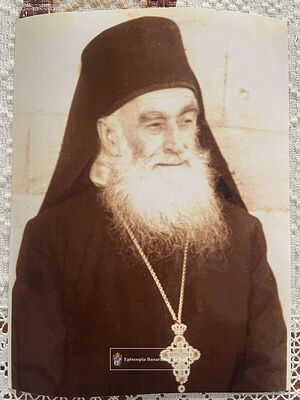 Photo: basilica.ro Protosinghel Iraclie (Flocea) was born on March 11, 1893, in Pojorâta, Câmpulung County (in Suceava today), receiving the name Ioan in Baptism.
Photo: basilica.ro Protosinghel Iraclie (Flocea) was born on March 11, 1893, in Pojorâta, Câmpulung County (in Suceava today), receiving the name Ioan in Baptism.
He was seriously wounded in war, nearly losing his left hand, but he was miraculous healed by God.
Fulfilling a promise he had made to God while in the trenches, he entered Hârbovăț Monastery, where became a monk in 1920, was ordained a hierodeacon in 1925, and a hieromonk in 1927.
From 1926 to 1930, he went to seminary in Chișinău, being distinguished by both his academic and spiritual pursuits. In particular, he was recognized as great homilist and wise confessor, merciful and generous to foreigners and devoted to his mission. He could also translate into several languages.
In 1940, after the dissolution of the monastery, he went to become a parish priest in Nisporeni. Seeing the persecution of the clergy and monks by the Soviet army, he sent whatever help he could to the surrounding monasteries until the return of the Romanian army in 1941.
He was then able to return to Hârbovăț Monastery, where he was involved in the renovation process and the return of monks who had been exiled by the Soviets.
Between 1941 and 1944 he served as Exarch of the monasteries of the Archdiocese of Chișinău, and in 1944, he was appointed diocesan vicar for the regions evacuated from the Archdiocese.
On August 2, 1945, he was arrested and sentenced to 8 years of hard labor in Siberia “for propaganda, agitation, and calls for the overthrow of the Soviet power.”
In the gulags, he zealously helped his fellow parishioners keep the flame of faith alive in their souls. He never denied his faith and never gave in to pressure.
He was released and returned home in 1953 and served at several monasteries. He spent the last years of his life as a spiritual father in the village of Chițcani until he reposed in the Lord on August 16, 1964. He was buried in the village cemetery under the watchful eye of the communist authorities.
On October 19, 1992, Protosinghel Iraclie was rehabilitated by the General Prosecutor’s Office of the Republic of Moldova.
In 2019, his remains were reburied at the cemetery of Noul Neamț Monastery. His family was given a portion of his relics to keep in their home, and in 2022, on the day of his repose (August 16), they began to stream myrrh, which became the impetus to begin investigating his life for the possibility of canonization.
Fr. Iraclie is remembered as a monk of holy life, a tireless missionary, preacher, prison confessor, and miracle worker, preaching the Gospel and bringing many to Christ despite all external circumstances.
Follow OrthoChristian on Twitter, Vkontakte, Telegram, WhatsApp, MeWe, and Gab!

